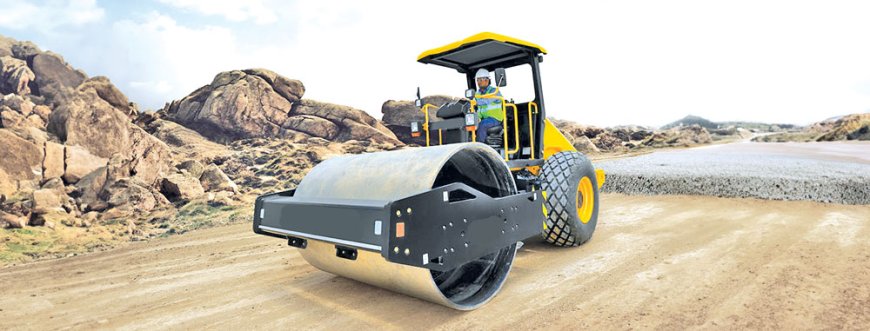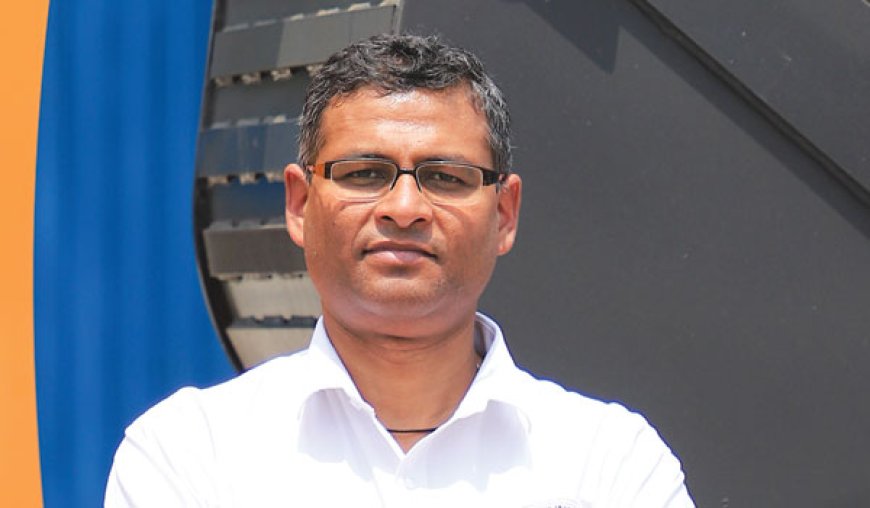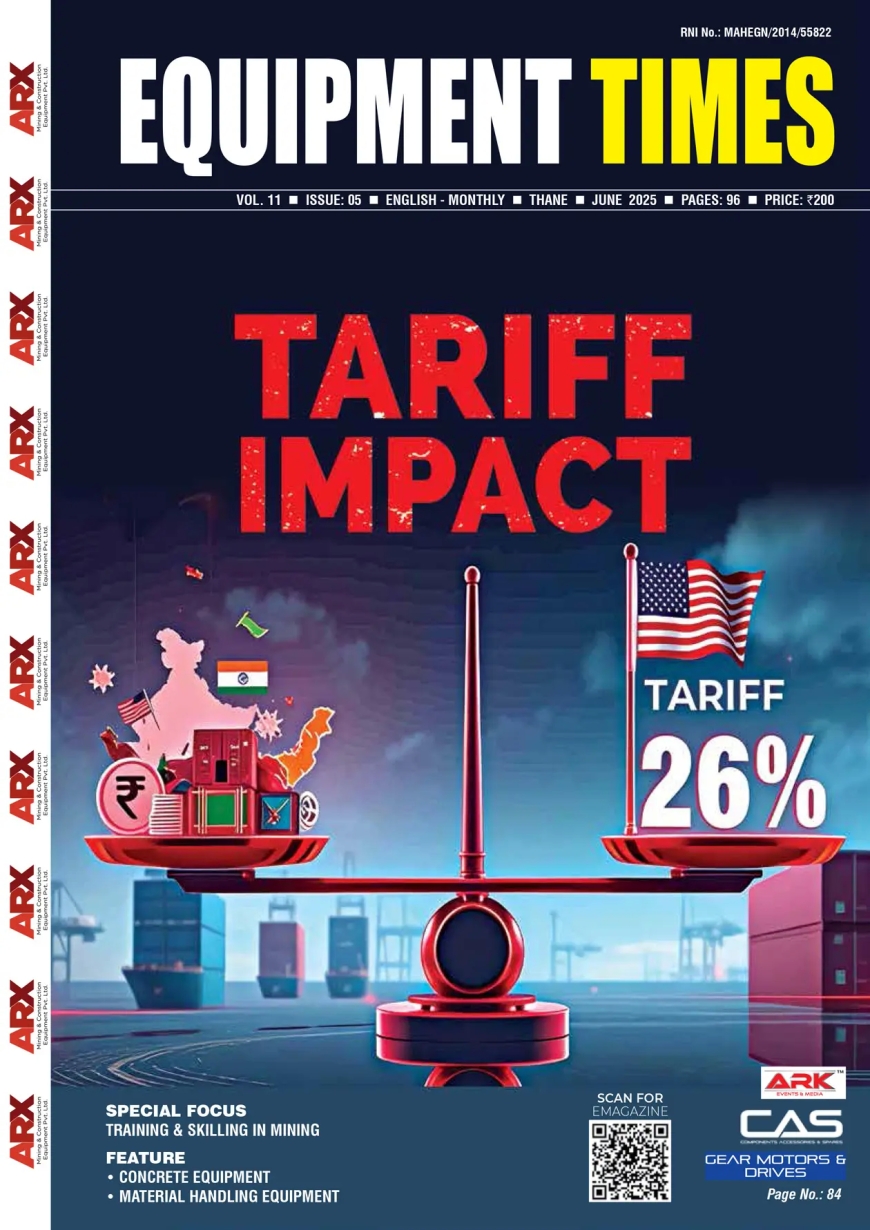ON SOLID GROUND
In the ever-evolving landscape of India’s infrastructure development, one crucial element stands out as the backbone of sturdy roads, robust buildings, and reliable foundations: compaction equipment.

In the ever-evolving landscape of India’s infrastructure development, one crucial element stands out as the backbone of sturdy roads, robust buildings, and reliable foundations: compaction equipment. As the nation surges forward with ambitious projects spanning highways, airports, railways, and urban infrastructure, the demand for efficient compaction machinery has reached new heights. Equipment Times delves into the burgeoning market for compaction equipment in India, examining the driving forces behind its growth, technological advancements propelling efficiency, and the broader implications for the country’s infrastructural progress.
In the symphony of construction, where every structure tells a story of human endeavour and ingenuity, one often-overlooked player silently orchestrates the rhythm of progress: compaction equipment. Nestled amidst the cacophony of bulldozers, cranes, and concrete mixers, these machines wield an unassuming yet pivotal role in laying the groundwork for India’s burgeoning infrastructure. From the urban jungles of Mumbai to the dusty plains of Rajasthan, the evolution of compaction equipment in India is not just a tale of technological advancement, but a narrative of resilience and innovation echoing through the annals of time.
The Dawn of a Revolution…
Rewind to the early days of independent India, where rudimentary tools and sheer manpower dictated the pace of construction. Roads were laid with hand-rolled tarmac, and foundations were compacted through laborious efforts of workers armed with nothing but wooden tampers. However, as the nation’s ambitions soared, so did the demand for more efficient methods.
The 1970s marked the advent of mechanical vibratory compactors, heralding a new era in India’s construction landscape. These machines, albeit crude by today’s standards, significantly expedited the compaction process, enabling engineers to tackle larger projects with newfound efficacy. As the nation grappled with rapid urbanization and infrastructural expansion, compaction equipment emerged as a beacon of progress, propelling India into the modern age of construction.
Engineering Excellence: Innovations in Action…
Fast forward to the present, and the Indian construction sector stands at the precipice of innovation, driven by a relentless pursuit of efficiency and sustainability. Today’s compaction equipment embodies the pinnacle of engineering prowess, seamlessly blending cutting-edge technology with the demands of real-world application.
In response to the country’s diverse terrain and climatic challenges, manufacturers have diversified their product offerings, introducing a plethora of compactors tailored to specific needs. From soil compactors adept at navigating the undulating topography of the Himalayas to tandem rollers engineered for the blistering heat of the Thar Desert, India’s compaction equipment arsenal leaves no stone unturned.
Furthermore, the advent of telematics and IoT (Internet of Things) has revolutionized equipment management, allowing construction companies to remotely monitor performance metrics, track usage patterns, and preemptively diagnose potential issues. This integration of digital solutions not only optimizes operational efficiency but also minimizes downtime, translating into substantial cost savings for stakeholders.
Market…
The market for compaction equipment in India has been experiencing steady growth due to various factors such as infrastructure development, urbanization, and investments in construction projects. Compaction equipment is essential in construction activities for compacting soil, gravel, asphalt, and other materials to ensure a stable foundation and longevity of structures.
Some key points about the market for compaction equipment in India include:
Infrastructure Development: India has been investing heavily in infrastructure development, including roads, highways, airports, and urban infrastructure. This has led to a significant demand for compaction equipment to ensure the quality and durability of these projects.
Government Initiatives: Initiatives such as the “Make in India” campaign and various infrastructure development programs launched by the government have further boosted the demand for compaction equipment. Government policies promoting infrastructure development have created a favorable environment for construction equipment manufacturers.
Urbanization: Rapid urbanization in India has led to an increased demand for residential and commercial buildings, as well as infrastructure to support urban growth. Compaction equipment is essential for preparing the ground for construction in urban areas.
Road Construction: With a focus on expanding and upgrading the road network across the country, the demand for compaction equipment for road construction and maintenance has been consistently high. This includes both national highways and rural roads.
Construction Equipment Market: The overall construction equipment market in India is witnessing growth, and compaction equipment is a significant segment within this market. Manufacturers are introducing advanced technologies and features to meet the evolving needs of the construction industry.
Competition: The market for compaction equipment in India is competitive, with both domestic manufacturers and international players vying for market share. Domestic manufacturers like Escorts Construction Equipment, ACE, and Greaves Cotton compete with global giants such as Caterpillar, JCB, and Volvo Construction Equipment.
Rental Market: The rental market for construction equipment, including compaction equipment, is also growing in India. Many construction companies prefer renting equipment rather than purchasing them outright due to cost-effectiveness and flexibility.
Overall, the market for compaction equipment in India is expected to continue growing in the coming years, driven by infrastructure development, urbanization, and ongoing construction projects across the country.
Paving the Path Ahead…
As India charts its course towards a future defined by sustainable development and inclusive growth, the role of compaction equipment becomes increasingly paramount. With ambitious initiatives such as the Smart Cities Mission and Bharatmala Project on the horizon, the demand for robust infrastructure continues to escalate, placing compaction equipment at the forefront of national progress.
However, amidst the clamor for expansion, the industry is not devoid of challenges. Issues ranging from regulatory hurdles to skilled labor shortages pose formidable obstacles to sustained growth. Additionally, the imperative to embrace eco-friendly practices necessitates a paradigm shift towards greener, more energy-efficient technologies.
Nevertheless, as history has shown, the spirit of innovation thrives in the face of adversity. With a steadfast commitment to excellence and a penchant for innovation, India’s compaction equipment sector is poised to carve a path towards a future where progress knows no bounds. In the symphony of construction, these silent sentinels shall continue to resonate, shaping the landscape of a nation on the cusp of greatness.
Industry Bytes….

Ramesh Palagiri, Managing Director & CEO, Wirtgen India, said, “The Wirtgen Group Hamm compactors come with more than 125 years of experience in the development and manufacture of roller and compactors for soil and asphalt compaction. HAMM, the German manufacturer leading the field in compaction technology, is a member of the internationally successful WIRTGEN GROUP and a global leader in the market of road rollers with more than 180 years of compaction expertise. In India we offer the Hamm HC 119i soil compactor, HD 99i Asphalt compactors, which are produced at our Pune plant. Hamm soil Compactors are built with patented design of three-point articulation joint. This connects the front and rear end of the compactor and enables excellent directional stability and provides driver safety on difficult terrains and also adds to driver’s comfort. With WITOS HCQ, HAMM has taken another leap forward, towards the digital construction site. Here, all process data that has been collected is transferred to the WITOS portal via the mobile network. Individual people who have been granted corresponding access rights, such as construction site managers, supervisory authorities or consultants, can then monitor the construction site in real time from any location using the WITOS portal, provided by the Wirtgen Group.”

Puneet Vidyarthi – Head of Marketing and Business Development, India & SAARC – CASE Construction Equipment, said, “At CASE, we are integrating state-of-the-art technology into our machinery. Our equipment incorporates intelligent functionalities aimed at optimizing performance, ensuring security, and enabling real-time monitoring. With SiteWatch technology, users can remotely monitor machine status, fuel consumption, and receive service alerts for proactive maintenance. This technology aligns with the AEMP 2.0 Telematics standards for efficient fleet management. Such smart capabilities in our equipment deliver instant insights into fuel consumption, battery status, and security, facilitating maintenance tasks and minimizing downtime. We at CASE understand the pivotal role of aftermarket services as a key differentiator in ensuring customer satisfaction and success. Our dedication to providing a holistic ownership experience extends to delivering exceptional after-sales services and solutions. In India, we have established an extensive network comprising 70 dealers and 200 touchpoints, all staffed by highly trained and certified professionals. This vast network guarantees that our customers receive top-notch aftermarket support, including swift assistance and expert guidance. To enhance the efficiency of our service offerings, we operate a cutting-edge 75,000 square feet central warehouse in Indore. This facility is capable of stocking an impressive 13,000 SKUs at any given time, enabling us to efficiently meet the needs of our customers. Additionally, we maintain two depots in Faridabad and Guwahati strategically positioned to ensure easy access to our services across India. Furthermore, All CASE equipment, whether light or heavy machinery, comes with a standard base warranty of one year from the delivery date. Understanding that each customer’s requirements are unique, we offer various extended warranties and service packages through our ‘CASE Protect’ and ‘CASE Care’ programs. Furthermore, through our in-house retail finance company ‘CNH Capital,’ we offer diverse financing options to alleviate financial strain on the customer. These programs are tailored to provide personalized support and assurance to our customers.”








